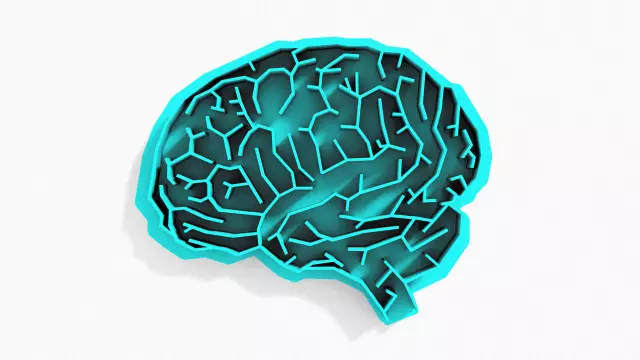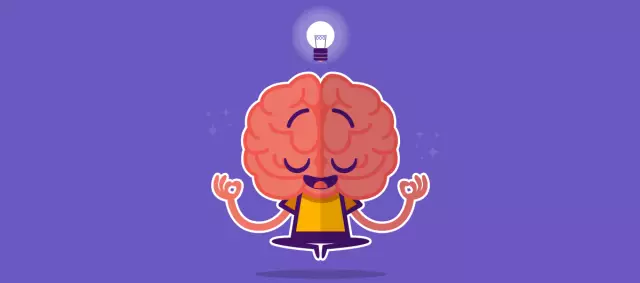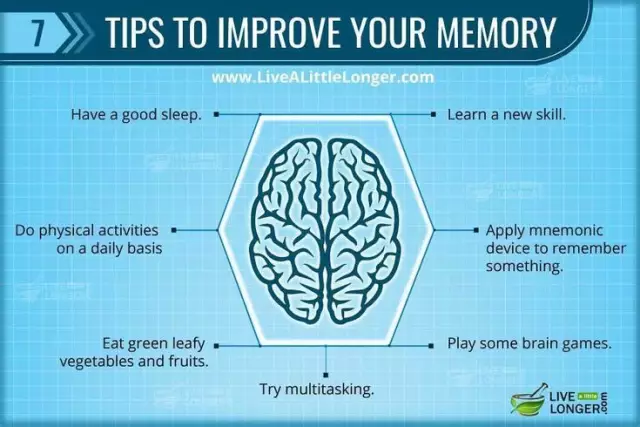- Author Rachel Wainwright wainwright@abchealthonline.com.
- Public 2023-12-15 07:39.
- Last modified 2025-11-02 20:14.
Mind Games: When Memory Fails
Have you ever felt like you are constantly forgetting about the things you use every day? Where did you put your bills or where did you leave your reading glasses? Did you enter the room only to realize that you cannot remember why you entered there? Did you have to read the line several times in order to concentrate and understand what it was about? Finding the word for a long time? Is it getting difficult to calculate the total value of your purchases? Can't handle your new phone? It may seem like this is just a stage of aging and you are doomed to endure these deteriorations in your quality of life.
The human brain is unique. At first, it triples in the first year of life and continues to grow until the age of 18, and then decreases as we age. A person begins to lose some of his memory abilities and acquired skills already at the age of 20. Our memory is filled through cognition and gives us a sense of ourselves, constitutes our constant life experience. From fond memories of childhood to where the keys are kept, it all makes us who we are. It is easy to imagine the human brain as a large filing cabinet of documents when amazingly complex processes are actually taking place. Memory, attention and solving everyday problems belong to one area of the human psyche - cognitive.
Cognitive (cognitive) abilities are the skills and mental processes required to complete everyday tasks. These include:
- memory;
- Attention;
- reading, listening comprehension;
- mathematical understanding;
- visual recognition.
These skills are related to the mechanisms of how you learn, remember, process and store information, and not with any amount of knowledge actually acquired. The concept of cognitive impairment is extremely broad and not always well defined. In summary, a person with a cognitive disorder has more difficulty with one or more types of mental tasks than the average person. People with profound cognitive impairments will need help in almost every aspect of daily life. Minor disturbances may never even be detected and the person is simply considered forgetful or absent-minded. Diseases that cause cognitive impairment can be accompanied by intellectual impairment. Nonetheless,cognitive and intellectual abilities are different concepts and the term "mental retardation" cannot be applied. For example, blindness physically turns off one of the tools of cognition and does not affect intelligence.

When there is not enough oxygen
Most cognitive impairments have some basis in human biology or physiology. This connection is most evident in the case of traumatic brain injury, stroke, tumor, congenital and genetic diseases. Other illnesses such as hypertension, diabetes mellitus, internal diseases, and chronic drug or alcohol poisoning have less clear links, but nevertheless alter the structure or chemistry of the brain. Conditions are very different, but impairment of memory and other aspects of the cognitive sphere have a common mechanism. The essence of the damage lies in insufficient blood supply to the brain (ischemia), oxygen starvation, followed by the destruction of its cells. Normally, occupying no more than 2% of your body's volume, your brain uses 20% of oxygen and blood. Even small changes in blood circulation can deprive cells of energy and impede mental activity, and the restoration of blood and oxygen flow to the cerebral cortex is of the greatest importance.
In sound mind and sober memory
The most widely known and effective drug for protecting brain function is the domestic drug Mexidol®. This unique drug is well known to doctors and patients, it is prescribed in the form of sequential therapy in order to obtain the maximum therapeutic effect: first a course of injections, then tablets. Mexidol® gained its recognition among neurologists, cardiologists, therapists and other professionals primarily due to its unsurpassed ability to overcome insufficient blood supply to the brain and heart muscle with the exceptional safety of the active ingredient. Efficacy and safety has been repeatedly confirmed in clinical studies. Mexidol® acts as a mental stimulant (nootropic): improves memory and increases learning ability,restores normal sleep and wakefulness, and also increases the brain's resistance to various harmful effects, such as excessive exercise or oxygen starvation. This is possible thanks to the main active ingredient - succinate (ethylmethylhydroxypyridine succinate), which is the main energy for cells and is a key link in their respiration.
The drug normalizes the energy metabolism of brain cells, which occurs when there is insufficient blood supply and oxygen starvation. Neutralizes free radicals, interferes with excessive oxidation of neurons and stabilizes cell membranes. It also promotes anticonvulsant and anti-anxiety effects, increases the body's resistance to stress. Protects blood vessels from plaque formation (atherosclerosis), has a hypoglycemic effect and helps to preserve the optic nerve and retinal cells. Mexidol® increases the body's resistance to the effects of various damaging factors, for example, in cases of cerebral circulation disorders, alcohol intoxication and antipsychotics (neuroleptics).
Mexidol® occupies a special place in the complex therapy of alcohol addiction. The drug reduces the toxic effects of ethanol and reduces anxiety without affecting the liver, which has been shown in research to have a positive effect on reducing symptoms and craving for alcohol (stabilizing remission).
Importantly, Mexidol® is combined with all drugs used to treat non-psychiatric diseases. It enhances the effect of some drugs prescribed for the human psyche: antidepressants, anticonvulsants. Individual intolerance is extremely rare, and from side effects in a few cases, nausea is noted. However, like many other medicines, the drug is contraindicated in acute renal and hepatic failure, therefore, a doctor's consultation is necessary.

To date, a new unique dosage has appeared - Mexidol® FORTE. This is the only existing double dosage of succinate on the Russian market. At the same time, safety and efficacy have also been confirmed in studies, including in patients with chronic cerebral ischemia on the background of arterial hypertension and atherosclerosis. In the studied patients with chronic insufficient blood circulation in the brain, there was a significant increase in memory by 25%, and in attention by 18% in just 74 days of observation. There was also a significant decrease in the severity of dizziness, unsteadiness of gait, tinnitus, headache and fatigue - symptoms accompanying chronic oxygen starvation of the brain. The new double dosage, with its effectiveness, is much more convenient, only 1 tablet of 250 mg 3 times a day (i.e. 3 tablets a day instead of 6 previously).
Mental lethargy, difficulty concentrating, and forgetfulness are common symptoms and can be especially severe in older adults, so much so that they are sometimes mistaken for dementia. The good news is that you can help yourself and your loved ones save yourself and get back to normal.
Found a mistake in the text? Select it and press Ctrl + Enter.






